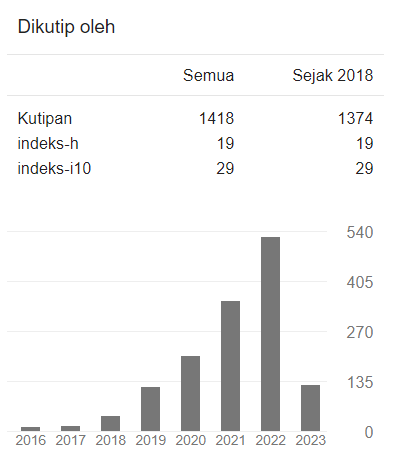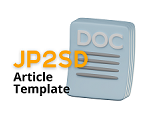Strategi Sekolah Dalam Menanamkan Nilai Antikorupsi Melalui Al Islam Kemuhammadiyahan Di SD Unggulan Muhammadiyah Lemahdadi
DOI:
https://doi.org/10.22219/jp2sd.v10i2.22357Abstract
The case of corruption in Indonesia is very worrying. The more cases, the greater the loss borne by the state, so a great effort is needed to prevent it. Prevention can not only be done by the rule of law alone but also requires the participation of all parties. One of them is through school. Therefore, schools are an essential element in efforts to prevent corruption. Therefore, it requires a school strategy to teach anti-corruption values integrated through Al Islam Kemuhammadiyahan. This study describes the school's strategy for instilling anti-corruption education through Al Islam Kemuhammadiyahan at the Superior Elementary School of Muhammadiyah Lemahdadi Bangunjiwo Bantul. This research is qualitative descriptive research with a field research model. The data are presented descriptively with the observation method about the school's strategy in instilling anti-corruption values integrated with Al Islam Kemuhammadiyahan in elementary schools. The data were obtained through interviews with the principal, vice chairman of the curriculum, and Al-Islam Kemuhammadiyahan teachers, as well as documentation in the form of documents or photos of activities. The data is analyzed by making the one obtained at school, filtered according to the fundamental theory, and presented in full according to the Miles and Huberman model. This study resulted in the concept that the school's strategy instilled anti-corruption values in several ways, namely 1) guided by the school tagline "Qur'ani, Intelligent, and Personality." 2) through school programs, including parenting, market day, tahsin, tahfidz, three languages (English, Arabic, and Javanese), and leadership training. 3) through the insertion of Al Islam Kemuhammadiyahan subjects, namely Moral Creed, Qur'an Hadith, and History of Islamic Culture
Downloads
References
Asmorodjati, A. W. (2017). Urgensi Pendidikan Anti Korupsi dan KPK dalam Pemberantasan Tindak Pidana Korupsi di Indonesia. The 6th University Research Colloquium 2017, 491–298.
Daulay. (2013). Pengembangan Model Pendidikan Antikorupsi melalui Media Komik bagi Siswa SD. Jurnal Sekolah Dasar, 1(22), 28–41.
Hakim, L. (2012). Model Integrasi Pendidikan Anti Korupsi dalam Kurikulum Pendidikan Islam. Jurnal Pendidikan Agama Islam-Ta’lim, 10(2), 141–156.
Izza, L. (2019). Menumbuhkan Nilai Anti Korupsi pada Anak untuk Membentuk Karakter Melalui “Semai Games” di MDTA Rabithatul Ulun Pekanbaru. Psychopolytan: Jurnal Psikologi, 2(2), 84–95.
Justiana, S. (2014). Buku ajar pendidikan dan budaya antikorupsi (PBAK). Pusat pendidikan dan pelatihan Tenaga Kesehatan.
Kemenag RI. (2013). Panduan penyenggaraan pendidikan antikorupsi di madrasah. Direktorat Jenderal Pendidikan Islam.
Majid, A., & Andayani. (2012). Pendidikan Karakter Perspektif Islam. Remaja Rosdakarya.
Manurung, R. T. (2012). Jurnal Pendidikan Anti korupsi Sebagai Satuan Pembelajaran Berkarakter dan Humanistik. Jurnal Sosioteknologi, XXVII(11), 234.
Montessori, M. (2011). Pendidikan Anti Korupsi Sebagai Pendidikan Karakter di Sekolah. J. Demokrasi, 11(1), 293–301.
Nurdin, M. (2014). Pendidikan Antikorupsi. Ar-Ruzz Media.
Poerwanti, E. (2021). Pemetaan Nilai Keunggulan Sekolah Dasar di Kota Malang. JP2SD (Jurnal Pemikiran Dan Pengembangan Sekolah Dasar), 9(1), 84–93. https://ejournal.umm.ac.id/index.php/jp2sd/article/view/18392
Pusat Edukasi Antikorupsi. (2020). Komisi Pemberantasan Korupsi. KPK. https://aclc.kpk.go.id
Puspito, N. T., Marcella, E. S., Utari, I. S., & Kurniadi, Y. (2011). Buku Pendidikan Anti Korupsi untuk Perguruan Tinggi. Kemendikbud dan DIKTI.
Salahudin, A. (2018). Pendidikan Antikorupsi. Pustaka Setia.
Sukmadinata, N. S. (2015). Metode Penelitian Pendidikan. Remaja Rosdakarya.
Sukmayadi, T., & Suyitno. (2020). Implementasi PPKn berbasis Nilai-nilai Islam di SD Muhammadiyah Kecamatan Depok Sleman Yogyakarta. JPK (Jurnal Pancasila Dan Kewarganegaraan), 1(5).
Suryadi, A., & Dkk. (2014). Pendidikan Untuk Transformasi Bangsa: Arah Baru Pendidikan Untuk Perubahan Mental Bangsa. Kompas.
Suyitno, & Dkk. (2021). Integrasi nilai-nilai keislaman dalam pendidikan antikorupsi di Sekolah Dasar Muhammadiyah se-Kapanewon Depok Yogyakarta. JPDI (Jurnal Pendidikan Dasar Indonesia), 6(2).
Suyitno, & Hidayah, Y. (2019). Strategi guru dalam menanamkan nilai-nilai anti korupsi di SD Muhammadiyah Wirobrajan 3 Yogyakarta. Makalah Seminar Nasional Pagelaran Pendidikan Dasar Nasional Di UAD. http://seminar.uad.ac.id/index. php/ppdn/article/ viewFile/1257/644
Suyitno, & Sukmayadi, T. (2019). Madrasah Antikorupsi TPA di Kecamatan Depok Sleman Yogyakarta. Makalah Seminar Nasional Hasil Pengabdian Kepada Masyarakat Di Universitas Ahmad Dahlan Yogyakarta. http://seminar.uad.ac.id/index.php/senimas/article/viewFile/2268/629
Transparency International. (2022). Corruption Perceptions Index 2021. https://images.transparencycdn.org/images/CPI2021_Report_EN-web.pdf
Wibowo, A. (2012). Pendidikan antikorupsi di sekolah: strategi internalisasi pendidikan antikorupsi di sekolah. Pustaka Belajar.
Wijaya, D. (2014). Pendidikan Antikorupsi Untuk Sekolah dan Perguruan Tinggi. Indeks.
Downloads
Published
Issue
Section
License
Copyright (c) 2022 Jurnal Pemikiran dan Pengembangan Sekolah Dasar (JP2SD)

This work is licensed under a Creative Commons Attribution-ShareAlike 4.0 International License.
Authors who publish with Jurnal Pemikiran dan Pengembangan Sekolah Dasar (JP2SD) agree to the following terms:
- For all articles published in Jurnal Pemikiran dan Pengembangan Sekolah Dasar (JP2SD), copyright is retained by the authors. Authors give permission to the publisher to announce the work with conditions. When the manuscript is accepted for publication, the authors agree to automatic transfer of the publishing right to the publisher.
- Authors retain copyright and grant the journal right of first publication with the work simultaneously licensed under a Creative Commons Attribution-ShareAlike 4.0 International License that allows others to share the work with an acknowledgment of the work's authorship and initial publication in this journal.
- Authors are able to enter into separate, additional contractual arrangements for the non-exclusive distribution of the journal's published version of the work (e.g., post it to an institutional repository or publish it in a book), with an acknowledgment of its initial publication in this journal.
- Authors are permitted and encouraged to post their work online (e.g., in institutional repositories or on their website) prior to and during the submission process, as it can lead to productive exchanges, as well as earlier and greater citation of published work (See The Effect of Open Access).

This work is licensed under a Creative Commons Attribution-ShareAlike 4.0 International License.


















